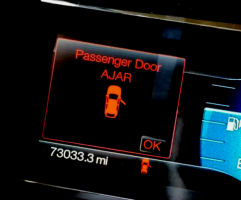
— A Ford "door ajar" light class-action lawsuit is moving forward as a federal judge granted in part and denied in part Ford's motion to dismiss the complaint.
According to the lawsuit, the vehicles are equipped with door latch mechanisms that cause sensors to wrongly indicate a door is open when it's really closed. Contaminated sensors allegedly cause "door ajar" warning lights that normally indicate the doors aren't completely closed.
Included in the door latch lawsuit are these models:
- 2011-2016 Ford Edge
- 2012-2014 Ford Flex
- 2013-2014 Ford Explorer
- 2011-2013 Lincoln MKX
- 2013 Lincoln MKT
The plaintiffs say the vehicles use door latch assemblies with electro-mechanical switches that detect if the doors are open or closed based on voltage sent from the switches. Body control modules monitor the voltage from the door latch switches and when the switches indicate the doors are closed, the modules send "wetting current" allegedly to keep the sensors clean.
The “wetting current” is “the minimum electric current needed to flow through an electrical contact to break through the surface film resistance on the contact” and to prevent oxidation that may occur from humidity and exposure to moisture. But the lawsuit alleges the wetting current is too low to clean the sensors, resulting in faulty "door ajar" warnings.
The plaintiffs claim that beginning in 2011, “a change in BCM [body control module] strategy resulted in a reduction of the wetting current sent out to clean the switch contacts by more than 75%,” which Ford admits “is not sufficient to keep the switch contacts clean and contamination build up [then] causes them to fail.”
The dirty sensors allegedly interfere with accurate voltage readings which “triggers an audible warning, activates a visual warning on the instrument panel, and sends out a visual intermittent ‘shift to park’ message” because the faulty sensor causes the computer system to mistakenly believe the vehicle has stopped.
In addition, “all interior lights are illuminated and the doors are unlocked, and they cannot then be manually relocked.” According to the lawsuit, this “can continue for several hours, even after the vehicle is parked and turned off, draining the battery and potentially stranding vehicle occupants.” Furthermore, the door's autolock features allegedly fail.
Ford issued a technical service bulletin in 2014 that told dealerships to use special tools to clean the sensors, a process called "burning the wires." This allegedly was supposed to fix the door ajar problems, but the plaintiffs claim the repairs were nothing more than a “work-around that did not repair the underlying defect but temporarily stopped it from manifesting for a short period of time.”
The plaintiffs claim Ford got off easy because the door latch problems reoccurred after the warranties expired, something that caused Ford to recommend the door latch assemblies be replaced and paid for by owners.
The class-action lawsuit says the door ajar problems are so severe that more than 2,700 complaints have been made to the government and 33,000 warranty claims have been filed with Ford.
However, Ford referenced a federal investigation into Edge door latch problems that concluded without safety regulators deeming a recall was necessary.
In October 2016, the National Highway Traffic Safety Administration (NHTSA) opened an investigation into door ajar complaints made by Ford Edge owners. But in March 2017, NHTSA closed the investigation by saying a safety-related defect trend had not been found.
Safety regulators said the door latches continued to function properly and remained secured, and the child safety locks continued to function properly. In addition, NHTSA said the problems didn't affect the crashworthiness of the vehicles and all safety systems continued to work.
The plaintiffs filed their original lawsuit in June 2017 and their first amended lawsuit in August 2017, followed by Ford's motion to dismiss in October 2017. In March 2018, the judge granted in part and denied in part Ford's motion to dismiss, so the plaintiffs filed a second amended complaint in April 2018.
Both parties then agreed the plaintiffs would file a third amended lawsuit without Ford being required to respond to the second.
In a previous motion, the judge allowed state-specific claims made by owners who purchased their vehicles from Ford dealerships in California and Illinois, but Ford was granted its request to dismiss certain warranty claims and won the judge over concerning misrepresentation claims made by drivers who didn't purchase their vehicles at authorized Ford dealerships.
The plaintiffs had been successful with claims Ford knew about the door ajar problems and that those problems could be considered safety hazards.
The plaintiffs also had success when arguing Ford failed to disclose the door latch problems, but Ford convinced the judge the automaker's warranty allows Ford to simply make "adjustments" to correct defective parts.
This third amended suit included more plaintiffs and includes violations of the consumer protection laws of three states where plaintiffs purchased their vehicles, as well as violations of implied warranty of merchantability laws. All these actions are leading to a proposed trial date of November 2019.
Ford filed a motion to dismiss three specific counts: A North Carolina breach of implied warranty claim, New Jersey Consumer Fraud Act claims and a claim of violating the Ohio Consumer Protection Sales Practice Act.
Ford lost its motion to dismiss a breach of implied warranty claim under North Carolina law, and the judge ruled against Ford concerning a failure to disclose the door ajar defect under the New Jersey Consumer Fraud Act.
However, the judge ruled in favor of Ford about the Ohio Consumer Protection Sales Practice Act. According to the judge, the plaintiff cannot establish a violation of the Act within the two years before he joined the lawsuit.
The Ford door ajar light lawsuit was filed in the U.S. District Court for the Northern District of California - David Baranco, et al., v. Ford Motor Company et al.
The plaintiffs are represented by Barnow and Associates, P.C., Blood Hurst & O’Reardon LLC, the Davenport Law Firm LLC, and McCuneWright LLP.




